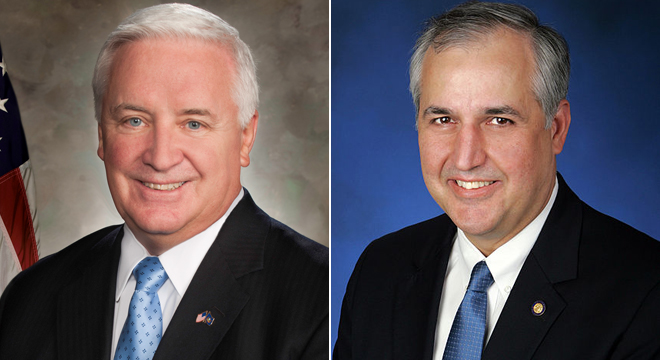Pennsylvania Republican leaders are backing away from a proposal to split the state’s electoral votes by Congressional districts, rather than the winner-take-all system used almost everywhere else — a proposal that would have potentially given the 2012 Republican presidential nominee a majority of the state’s electoral votes even if they didn’t carry the state’s popular vote.
“I see no movement on it. I’m not going to push for movement, but I still support it,” Governor Tom Corbett told a Pennsylvania Press Club luncheon on Monday, the Associated Press reports.
A Quinnipiac poll in September showed a majority of Pennsylvanians opposing the plan, seeing it as being geared to help Republicans, rather than the sponsors’ stated views of better reflecting the state’s voters.
In addition, some of the state’s Republican members of Congress were leery of the bill, reportedly because it would lead to Democrats more aggressively targeting their districts rather than concentrate on get-out-the-vote efforts in major urban centers like Philadelphia.
The Allentown Morning Call also reports that the lead sponsor of the bill, state Senate Majority leader Dominic Pileggi (R), is backing off — though he is also publicly leaving the door open to trying again some time next year.
Pileggi posted Monday on Facebook:
The proposal to reform the allocation of Pennsylvania’s electoral college votes is a significant change with considerable impact. Advancing this legislation will require a concerted and sustained effort involving the Senate, the House and the Governor. At this time, my primary focus is completing our work on legislation regarding education reforms, the Marcellus Shale industry and transportation funding. When those items are finished, we can revisit the electoral college reform legislation, although I do not believe there will be sufficient time to advance it this year.
Had this proposed system been in place in 2008, when Obama won the state by a 55%-44% margin, he in fact would have only taken 11 out of the state’s 21 electoral votes at the time — due to a combination of past Republican-led redistricting efforts to maximize their district strength, and Obama’s votes being concentrated within urban areas.
Pennsylvania is classified as a swing state, and is regularly toughly contested with a narrow final result. However, it has voted Democratic in every presidential election since 1992, and voted for Barack Obama by 11 points in 2008. Indeed, over the past 50 years it has only voted Republican in presidential landslides for the GOP: 1972, 1980, 1984, and finally 1988. The last time Pennsylvania voted Republican during a close national race was 1948, when it picked Tom Dewey over the victorious Harry Truman.






